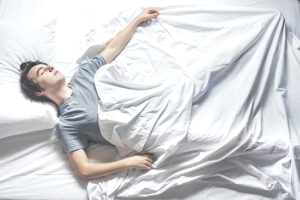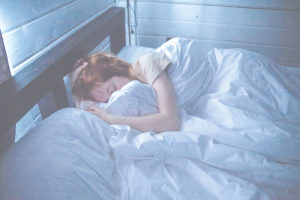10 Ways to Get a Good Night’s Sleep

In an ideal world, we should aim to get seven or eight hours of sleep a night because good quality sleep is essential in order to stay healthy, for aging well or to simply having enough stamina to make it through the day. The body needs rest, both to recover and regain strength after the day’s physical activities, and to recharge —particularly following challenging mental tasks. However, as we age getting adequate sleep just seems to get harder and harder, so here are some steps to hopefully help you overcome the difficulties, and get a good night’s sleep.
1. Maintain a consistent routine.
Try to go to bed at the same time each night and wake up at the same time each morning. A set sleep schedule can help to train you to fall asleep more easily just as it does for children who are coached into a bedtime ritual. This is because your body’s circadian rhythm functions on a set loop, aligning itself with sunrise and sunset. Also during increased exposure to daylight, your body will produce Melatonin which is a key sleep hormone that tells your brain when it’s time to relax. Although extremely popular worldwide, melatonin supplements may not be readily available here in Thailand so it is best to check with your doctor or international hospital.
2. Avoid Electronics and try to create  the right environment for sleep.
the right environment for sleep.
No lying in bed watching TV. No looking at your mobile phone, iPad, or laptop. In fact, it is best to remove all electronic devices from the bedroom. Also, do what you can to ensure that the room is quiet and dark- this could extend to getting blackout curtains or blinds to help you attain this. Exposure to light during the day is beneficial, but nighttime light exposure has the opposite effect so another idea is to install an app (available on I phone and Android) to block blue light. Try to leave a gap of 2 hours or as long as possible, when you stop using mobile devices or watching TV before bedtime.
3. Cut down on caffeine
Especially true later in the day as coffee in the afternoon can mean a sleepless night. Caffeine also increases the need to urinate during the night so instead, you may want to try taking warm milk or snacking on nuts, bananas, honey or eggs which all contain the sleep-inducing substance tryptophan. However, in general, it is advisable not to eat too much before going to bed and an earlier dinner time can help improve your sleep
 4.Exercise.
4.Exercise.
Daily walks, runs, swims, or however you take your exercise will provide sleep benefits. Exercising helps you fall asleep faster, attain a higher percentage of a restorative, deep sleep, and awaken less often.
5.Control the room temperature
You need to control your bedroom temperature because anything below 18 degrees or above 24 degrees (which is more likely here in Pattaya) can disrupt your sleep. Ideally, you want to set your room temperature around 21 degrees. However, if you are unable to do this here are some things you can try
Take a cool shower before going to bed.
Have a glass or bottle of water on your bedside table, as a few sips can help cool you down.
If you wake in the night place a cool, wet towel on your forehead
Try using a thin sheet rather than a duvet
6. Don’t smoke before bedtime.
Nicotine is a potent drug that speeds up your heart rate, raises blood pressure, and stimulates brainwave activity. For this reason plus so many more, you should avoid smoking before bedtime and ideally give it up altogether.
7. Beware of alcohol.
Wine, beer, or indeed any alcoholic drink can initially help you to fall asleep quickly, but this effect dissipates after a few hours. Also, alcohol suppresses REM sleep (Rapid Eye Movement sleep) which is when we dream. Dreaming is important because research has found that people who dream (and remember their dreams) heal more quickly from depressed moods and emotional hardships.
8.Reduce long daytime naps
OK, this is a tricky one because there are pros and cons to napping. Whilst short power naps have been found to be beneficial, long or irregular napping during the day can negatively affect sleep. Sleeping in the daytime can confuse your internal clock which can mean that you struggle to get to sleep at night. So the rule of thumb is to nap for 30 minutes or less to enhance daytime brain function but avoid anything longer.
9. Don’t just lie there.
If you haven’t fallen asleep after about 20 minutes in bed, get up, go into another room, and meditate or read for a while to relax. Otherwise, you are likely to become anxious about not falling asleep and you will spend even more time tossing and turning. The same thing goes if you wake during the night and cannot go back to sleep.
10. Avoid sleeping pills.
These can become habit-forming. If you really feel the need to take sleep medicine, perhaps to break a bad sleep cycle routine, talk to your doctor about how to use it effectively and for only a limited time. Many prescription medications, including sleep aids and antidepressants, can suppress dreaming and as mentioned earlier this prevents good quality sleep
Instead of medication, why not consider natural sleep aids:
Ginkgo biloba, a herb that can aid sleep and relaxation,
Valerian root that reduces stress and helps you to fall asleep.
Increasing your levels of Magnesium can also improve relaxation and enhance sleep quality,
Taking 100–200 mg of the amino acid L-theanine before going to bed.
Simply sleeping with Lavender in a vase by the bed or dried in a scented pillow has been known to help some with its calming effect.
Unfortunately, nothing is a completely foolproof and not all of our suggestions will suit everyone just keep trying different sleep strategies until you hopefully find what is best for you.
zzzzzzzzzzzzzzzzzzzzzz……………………sorry just dropped off there for a minute!
